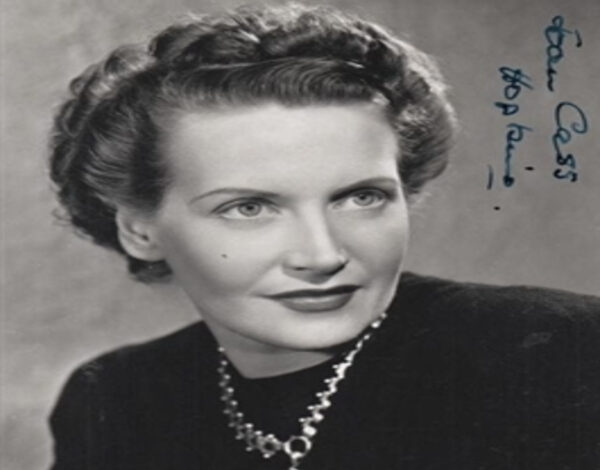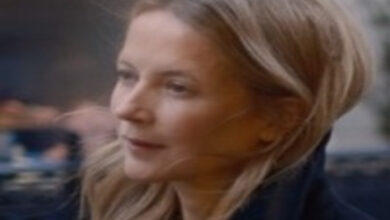Joan Hopkins: The Graceful Icon of British Cinema
Discovering the Remarkable Journey of Joan Hopkins, a Leading Lady of the UK Film Industry in the 1940s

Joan Hopkins, a name synonymous with grace, talent, and classic British cinema, was a celebrated stage and film actress whose brief yet impactful career left an indelible mark on the entertainment industry. Rising to fame in the late 1940s, Hopkins captivated audiences with her nuanced performances and undeniable screen presence. Best known for her starring roles in The First Gentleman and The Weaker Sex, she epitomized the poise and elegance of the post-war era’s leading ladies. Her story is one of passion, dedication, and timeless artistry.
Early Life and Background
Born on August 31, 1915, in Wandsworth, London, Joan Hopkins grew up during a time of great social and political transformation in the UK. Her early life, shaped by World War I and the changing roles of women in society, inspired a strong sense of determination and resilience. Joan pursued acting from a young age, eventually training at the Royal Academy of Dramatic Art (RADA), where she refined the skills that would soon define her performances on stage and screen.
Rising Star of British Theatre
Before her transition to film, Joan Hopkins made a name for herself in the theatre world. Her stage performances earned critical acclaim for their emotional depth and versatility. She tackled a range of roles that showcased her talent, from Shakespearean heroines to contemporary women struggling with the realities of modern life. The theatrical foundation of her career laid the groundwork for the cinematic success that was to come.
Breakthrough into British Cinema
Joan Hopkins’ film debut came at a time when British cinema was experiencing a renaissance. Her breakthrough role as Princess Charlotte in The First Gentleman (1948) put her on the map. The film, a historical drama, showcased her ability to blend regal poise with emotional authenticity. That same year, she starred as Helen in The Weaker Sex, a box office hit that portrayed the strength and sacrifices of women during World War II.
These performances established her as one of the UK’s most promising film stars. Audiences were drawn to her natural beauty, expressive eyes, and compelling voice. Hopkins was not just another pretty face—she brought intelligence and dignity to every role, becoming a symbol of British resilience and class.
Joan Hopkins: Actor of Emotional Depth
Joan Hopkins was not limited to period dramas or war stories. Her ability to portray a wide range of emotions made her a favorite among directors and audiences alike. In Man on the Run (1949), she played Jean Adams, a woman caught in a web of suspense and drama. Her role demonstrated her skill in the thriller genre and added another layer to her versatile filmography.
Her final film, Double Confession (1950), was a psychological thriller that saw her delivering a powerful and emotionally charged performance. Although it marked the end of her film career, it was a fitting finale that encapsulated her strengths as an actor.
Transition to Television
After 1950, Joan Hopkins transitioned to television, a medium that was rapidly gaining popularity. She continued to act in a variety of roles, bringing the same depth and grace to the small screen that she had shown in cinema. Her television work, though less documented, helped pave the way for future generations of actresses making similar transitions.
Personal Life and Marriage
Joan Hopkins was married to the respected film director Henry Cass. Their partnership was both personal and professional, as Cass directed several of the films in which Hopkins starred. Despite her rising fame, Hopkins valued privacy and maintained a relatively low profile outside of her acting career. She lived a life devoted to her craft and her family, embodying the elegance and restraint that defined her screen persona.
Legacy of Joan Hopkins: UK Film Star
Though her time in the spotlight was brief, Joan Hopkins remains an important figure in the history of British cinema. She represented the new wave of women in post-war films—strong, complex, and emotionally rich characters who reflected the changing role of women in society. Her performances in The Weaker Sex and The First Gentleman continue to be studied for their historical and cultural significance.
As a UK film star, Joan Hopkins helped shape the identity of British cinema during a pivotal era. Her influence extended beyond the screen, inspiring young women to pursue acting and breaking barriers in an industry that was still finding its voice.
Joan Hopkins Actor: A Role Model for Future Generations
The phrase “Joan Hopkins actor” brings to mind not only her professional achievements but also her role as a trailblazer for future generations of actresses. She demonstrated that talent, discipline, and authenticity could elevate an actress beyond typecasting and into the realm of artistry. Her legacy lives on in film retrospectives, academic studies, and the continued admiration of classic film enthusiasts.
The Quiet Departure from the Limelight
Unlike many stars of her era, Joan Hopkins chose to step away from fame at the height of her career. Her decision to leave film after 1950 remains a topic of speculation, but many believe it was a deliberate choice to prioritize personal happiness over public acclaim. She passed away on December 27, 2002, leaving behind a legacy of unforgettable performances and a standard of excellence for those who followed.
Conclusion: Remembering Joan Hopkins
Joan Hopkins was more than just a talented actress—she was a cultural icon, a pioneer for women in film, and a symbol of British cinematic elegance. From her early days on stage to her memorable roles in post-war dramas, she embodied the spirit of her time. As “Joan Hopkins actor” and “Joan Hopkins UK film star,” her name deserves a place among the legends of classic cinema.
Her work continues to inspire and educate, proving that true talent transcends time. Whether rediscovered through vintage film festivals or academic research, Joan Hopkins remains a timeless figure whose contributions to the arts are both significant and enduring.



